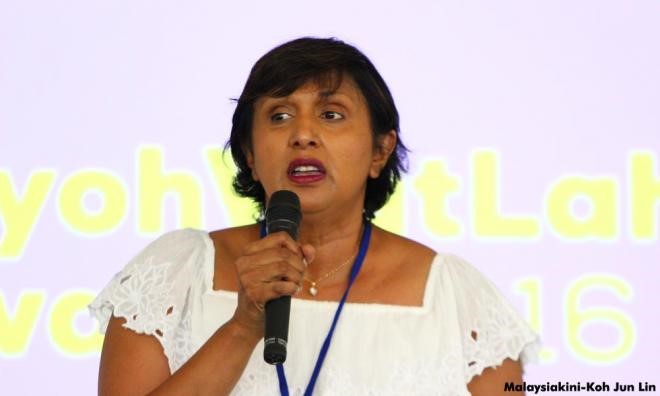By Martin Vengadesan | Malaysiakini

Despite several prominent sexual harassment cases being highlighted amongst the legal fraternity, nothing is being done to address the situation, said Association of Women Lawyers deputy president Meera Samanther.
“So many cases have been brought up, and we need to ask why women in the legal industry are resorting to social media to report sexual harassment.
“This itself means that the mechanism needs to be improved and that they don’t trust the system,” Meera told Malaysiakini.
Over the past year, there have been a number of prominent cases including a well-known law firm being hit by accusations of sexual harassment as well as a lawyer lodging a police report in June 2019 alleging that another lawyer had groped her at the Criminal Lawyers Annual Party (Clap).
It is understood that this case is up for its next hearing on July 23.
“Despite the prevalence of sexual harassment in the legal profession, to-date there is no mandatory requirement by the Bar Council that law firms put mechanisms in place to address sexual harassment matters, including introducing and implementing clear policies and practices for all individuals within the legal firm”, said Meera.
Meera cited a 2014 study conducted by the AWL which found that 31 percent of the respondents experienced “some sexual propositions and gender-based issues” including “various forms of suggestive remarks to suggestive invitations and includes physical harassment”
The survey also revealed that younger lawyers are more likely to be sexually propositioned by their colleagues, clients or bosses.
“A 2019 survey by the International Bar Association (IBA) revealed that in Malaysia, only 17 percent of respondents indicated that their workplace has existing policies to address sexual harassment matters.
“AWL would like to emphasise that individuals who have been raped, sexually assaulted and sexually harassed have to deal with a variety of emotions and the psychological impact of such incidents including coping with feelings of humiliation, degradation, shame, embarrassment, as well as anger, frustration and grief,” she added.
Informal support systems
The lack of trust in the system has even led to female lawyers devising an informal way of protecting each other in the face of predatory behaviour from some of their colleagues, especially at social events involving the legal fraternity. This includes the sharing of names of “gatal” lawyers.
Lawyer New Sin Yew said he agreed with Meera’s statement.
“Sexual harassment in the legal profession is something that we do not talk about enough, and it’s often swept under the carpet.
“It’s time to destigmatise sexual harassment and encourage more victims to come out and share their stories. Why should it be the case that victims are afraid to come out instead of the perpetrators?
“Something is really wrong here. We can change this by having policies and complaint mechanisms in place to address cases of sexual harassment where victims will feel assured in coming out.
“It’s high time we have an honest and serious conversation about sexual harassment in the legal profession, he told Malaysiakini.
Senior human rights lawyer Honey Tan said that women lawyers are no more or less likely than other survivors of sexual harassment to initiate a suit.
“As lawyers, the survivors will know how difficult it is regarding evidence and the adversarial process.
“If the survivor is a litigator, there is the added layer of knowing the justice chain actors.
“Having an in-house process is usually the better way to go. Most survivors want sexual harassment to stop, and they want a safe working environment. Of course, the harasser must also face the consequences of his misconduct,” she told Malaysiakini.
Bar needs to act
Meera suggested that to effectively stamp out sexual harassment, the Bar Council should ensure that law firms, regardless of size, adopt workable internal policies and practices with the following core elements:
1. To recognise that sexual harassment is a form of gender-based violence and is a violation of human rights. The pervasive nature of sexual harassment in the workplace is a reflection of the existing unequal power relations.
2. To recognise that there is an obligation to provide a safe and conducive working environment for all individuals.
3. To recommend workplace procedures that are suitable and effective to investigate and take action, where necessary, and to ensure that investigations are conducted by independent and unbiased individuals.
4. To emphasise equality of treatment for those reporting and those accused of sexual harassment. Sexual Harassment within the legal fraternity must be eradicated.
5. To recognise that gender inequality sits alongside and across other forms of inequalities, such as race, disability, sexual orientation and age. How these intersect to shape sexual harassment policies, responses to reports, or avenues of redress, needs to be woven through all work on sexual harassment.
6. To advocate for sexual harassment legislation in Malaysia that will properly address the highly complex and sensitive issue of sexual harassment effectively and efficiently.
The previous Pakatan Harapan government had proposed sexual harassment legislation that was due to be put before the Dewan Rakyat in March 2020. However, due to the collapse of the government and the subsequent postponement of parliamentary sittings, it remains to be seen whether the legislation will be brought to parliament.
It is understood that the Bar Council has received Meera’s statement and will respond shortly.



